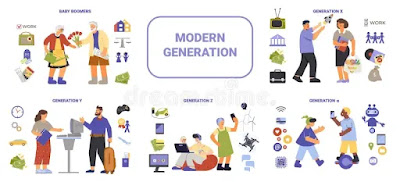Generations are often labeled based on historical, cultural, and economic milestones. These labels aim to define cohorts with shared experiences, yet they predominantly reflect Western-centric perspectives. Can such classifications encompass the diversity of global realities, or are they narrowly tailored to Western socio-political contexts? Let’s delve into the history of generational labeling and its implications for a broader understanding of the world's complexities.
The Origins of Generational Labels
The concept of generational labeling emerged in the 20th century. Sociologists assigned these labels based on significant events shaping Western societies. For instance:
- The Greatest Generation
(1901–1927):
Born amidst World War I and the Great Depression, this generation bore
witness to monumental changes like the fall of empires (Ottoman,
Austro-Hungarian, and Russian) and the rise of independence movements
globally. Events like China’s 1911 Revolution and India’s Jallianwala Bagh
massacre are glaring reminders that transformative events were not
confined to the West. This cohort, also known as the World War II Generation, is renowned for enduring the hardships of the Great Depression and contributing significantly to the Allied victory in World War II. Their resilience and collective efforts laid the foundation for post-war prosperity and societal transformation. Encyclopedia Britannica
- The Silent Generation
(1928–1945):
These individuals endured the Great Depression and the horrors of World
War II. Yet, outside the Western narrative, parallel events like Japan’s
invasion of Manchuria, the Spanish Civil War, and the Holocaust scarred
this generation worldwide.
Post-War Optimism and the Baby Boomers
The Baby Boomer Generation (1946–1964) arose in an era of post-war recovery and prosperity in the West. In contrast, other parts of the world experienced turmoil:
- The Partition of India in 1947 triggered one of the largest migrations in history, leaving millions displaced and traumatized.
- Decolonization led to bloody conflicts across Asia, Africa, and the Middle East.
- The rise of communist regimes in China and Cuba reshaped global geopolitics.
Despite these global upheavals, the term "Baby Boomer" romanticizes an era that was far from universally peaceful.
Baby Boomers have been a dominant force in American life, influencing cultural, economic, and political spheres. Their sheer numbers and active participation in various movements have left an indelible mark on society.
Generation X: A Global Perspective
Generation X (1965–1980) was dubbed the "MTV Generation" in the West, symbolizing consumerism and pop culture. However, beyond the American suburbs:
- Southeast Asia faced the Vietnam War, the Khmer Rouge regime, and widespread instability.
- In South Asia, the Bangladesh Liberation War of 1971 brought unprecedented violence and displacement.
- The 1973 oil crisis and subsequent global recessions reshaped economic realities across developing nations.
While the West enjoyed economic recovery and cultural vibrancy, much of the world endured war, poverty, and political suppression.
Generation X holds a significant share of cultural power, particularly in media and entertainment. They lead in press and news media, with over half of America's largest news corporations having a Gen X CEO. Additionally, approximately 50% of Oscar winners in 2020 were from Generation X, highlighting their influence in film and television. World Economic Forum
Millennials and Gen Z: A Divergence in Realities
Millennials (1981–1996) are characterized by their tech-savvy nature and progressive values. Yet, global inequalities persisted:
- In Rwanda, the 1994 genocide left scars on an entire generation.
- The Yugoslav Wars led to the ethnic cleansing of Bosnian Muslims.
- In Pakistan, authoritarian regimes stifled freedoms, and the drug culture fueled by the Afghan War wreaked havoc on society.
Generation Z (1997–2010) grew up in the digital age, yet their lives were shaped by conflict and economic instability in many regions:
- The post-9/11 wars in Iraq and Afghanistan displaced millions.
- In Gaza, children witnessed constant bombardment and blockades.
- The Syrian Civil War created one of the worst refugee crises in modern history.
Generation Alpha and the Looming Challenges
Generation Alpha (2011–2024) may be the most technologically advanced cohort yet, but their world is far from ideal. While children in developed nations enjoy digital education and AI-driven tools, their counterparts in war-torn regions face hunger, displacement, and systemic oppression. From the Syrian refugee crisis to the Taliban's resurgence in Afghanistan, the challenges for this generation are immense and unevenly distributed.
The Future: Generation Beta
As Generation Beta (2025–2039) emerges into a world dominated by artificial intelligence and automation, the disparities between regions could widen further. While technology holds promise, millions in developing nations still grapple with hunger, illiteracy, and political instability.
In summary, each generation has produced prominent individuals and spearheaded developments that have profoundly impacted society. While the Baby Boomers have been particularly influential due to their numbers and active participation in societal changes, Generation X has made notable contributions in cultural domains. The Greatest Generation's legacy of resilience and sacrifice continues to be honored, and Millennials are currently shaping the workforce and technological advancements.
Generational labels reflect a narrow lens, often overshadowing the diverse realities of non-Western societies. While these classifications provide insights into cultural and economic shifts, they risk reinforcing stereotypes and ignoring the struggles of marginalized populations. To truly understand humanity’s shared journey, we must broaden our perspectives and acknowledge the multiplicity of global experiences.
References
- "A Year-by-Year Guide to the Different Generations." Parents.
- "Age Range by Generation." Beresford Research.
- "The American Generations: Names, Years, & Key Differences." Britannica.
- "Gen Beta kicks off in 2025: Your guide to all the generation names and years." ABC News.
- "List of Generation Names Year Wise: Gen Z, Millennials, Baby Boomers, and More." GeeksforGeeks.




No comments:
Post a Comment